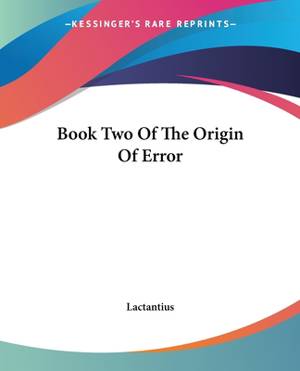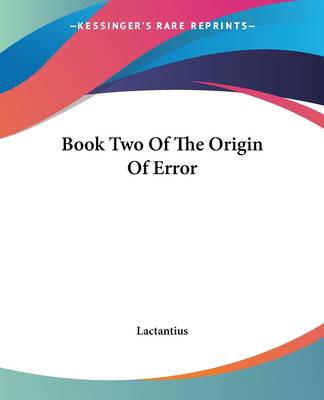
- Retrait gratuit dans votre magasin Club
- 7.000.000 titres dans notre catalogue
- Payer en toute sécurité
- Toujours un magasin près de chez vous
- Retrait gratuit dans votre magasin Club
- 7.000.0000 titres dans notre catalogue
- Payer en toute sécurité
- Toujours un magasin près de chez vous
Description
Book Two of The Origin of Error by Lactantius is a philosophical treatise that explores the origins of false beliefs and erroneous thinking. Written in the fourth century AD, the book is divided into three sections, each of which examines a different aspect of the problem of error.In the first section, Lactantius argues that error arises from ignorance and the failure to understand the true nature of things. He contends that people are prone to error because they are often misled by their senses and emotions, and that only through reason and education can they overcome these limitations.The second section of the book focuses on the role of language in the propagation of error. Lactantius argues that language is inherently ambiguous and that the meanings of words are often subject to interpretation. He contends that this ambiguity can lead to misunderstandings and false beliefs, and that only by carefully scrutinizing the meanings of words can people avoid falling into error.The final section of the book examines the relationship between error and religion. Lactantius argues that many false beliefs arise from religious superstition and that only through the use of reason and critical thinking can people arrive at a true understanding of God and the nature of the universe.Overall, Book Two of The Origin of Error is a thought-provoking and insightful work that explores the complex nature of human cognition and the difficulties inherent in arriving at a true understanding of the world around us.Nor are the poets to be listened to, who say that in the beginning was a chaos, that is, a confusion of matter and the elements; but that God afterwards divided all that mass, and having separated each object from the confused heap, and arranged them in order, He constructed and adorned the world. Now it is easy to reply to these persons, who do not understand the power of God: for they believe that He can produce nothing, except out of materials already existing(4) and prepared; in which error philosophers also were involved.This scarce antiquarian book is a facsimile reprint of the old original and may contain some imperfections such as library marks and notations. Because we believe this work is culturally important, we have made it available as part of our commitment for protecting, preserving, and promoting the world's literature in affordable, high quality, modern editions, that are true to their original work.
Spécifications
Parties prenantes
- Auteur(s) :
- Editeur:
Contenu
- Nombre de pages :
- 60
- Langue:
- Anglais
Caractéristiques
- EAN:
- 9781419110498
- Date de parution :
- 17-06-04
- Format:
- Livre broché
- Format numérique:
- Trade paperback (VS)
- Dimensions :
- 190 mm x 235 mm
- Poids :
- 117 g

Les avis
Nous publions uniquement les avis qui respectent les conditions requises. Consultez nos conditions pour les avis.






